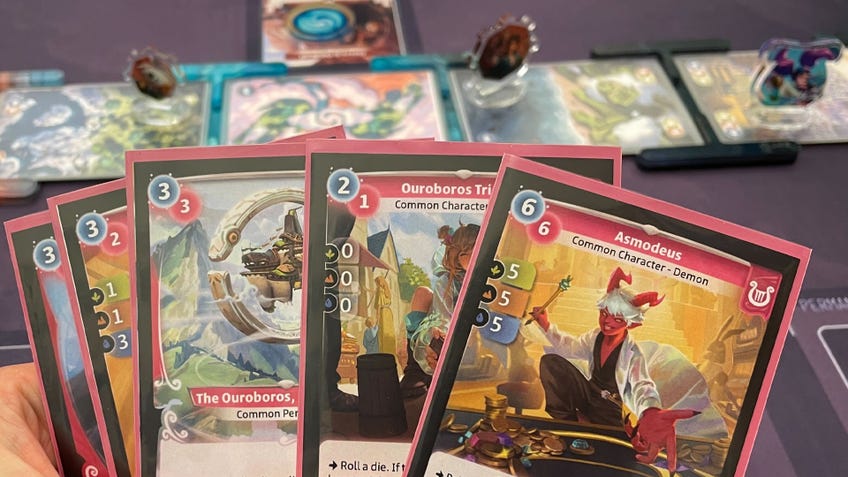This revolutionary trading card game wants to fix one of the worst things about Magic: The Gathering and Pokémon
Altered TCG will let you print as many copies of a card as you like.
Upcoming trading card game Altered plans to overcome the frustration of chasing hard-to-find cards in booster packs by letting you print as many copies of a card as you like. You’ll also be able to buy and sell the digital rights to individual cards, allowing players to freely trade the ability to print the cards they need on demand.
The ambitious TCG comes from designer Régis Bonnessée, who previously ran Dixit studio Libellud before founding indie studio Equinox. The studio includes staff who previously worked on games including Blizzard’s digital card game Hearthstone, along with veteran Magic: The Gathering players and a former MTG World Champion who is working with the team.
In a preview event at this year’s Essen Spiel convention in Germany, the creators outlined their desire to recapture the “nineties feeling” in a TCG and bring back a sense of surprise they felt had been lost in modern TCGs.
Altered’s gameplay - said to draw from the likes of MTG, as well as The Witcher’s in-game card game Gwent - will be quickly familiar to anyone who’s played MTG before, albeit with some fresh ideas.
Rather than competing to damage each other directly, players use the characters in their deck to compete over a central line of biome cards, each requiring specific matching icons to claim domination. The aim is to unite your deck’s leader and their companion, who start at opposite ends of the semi-randomised line of cards. To move either character forward toward victory, you must play more cards matching the characters’ current biome than your opponent, which stops your rival from advancing. (If the players draw, both move.)
The adventurous, racing feel of these central ‘expeditions’ is part of a conscious effort to steer Altered away from depicting any trauma or bloodshed. The positive tone of the game is matched by the artwork on its cards - depicting folk heroes such as Mulan and Goldilocks, alongside real-life figures such as Amelia Earhart and the fantasy setting’s original characters - which strives for inclusive representation of disabilities, diversity and character depictions that reflect the variety of appearances among individuals.
These characters will be aligned with six different factions set within Altered’s fantasy setting, said to be a world similar to Earth but shaped by a mysterious event known as the Confluence.
The factions include the harmony-seeking druid Muna, inspired by Asian cultures and Hinduism; the ideologist Ordis, made up of statespeople seeking justice; the wizards of Yzmir, who study the Confluence and control magic; the engineering Axiom, who seek to improve living via science; the artistic Lyra, who will boast some of the TCG’s most creative gameplay effects; and the adventuring Bravos, said to lead the way and push limits.
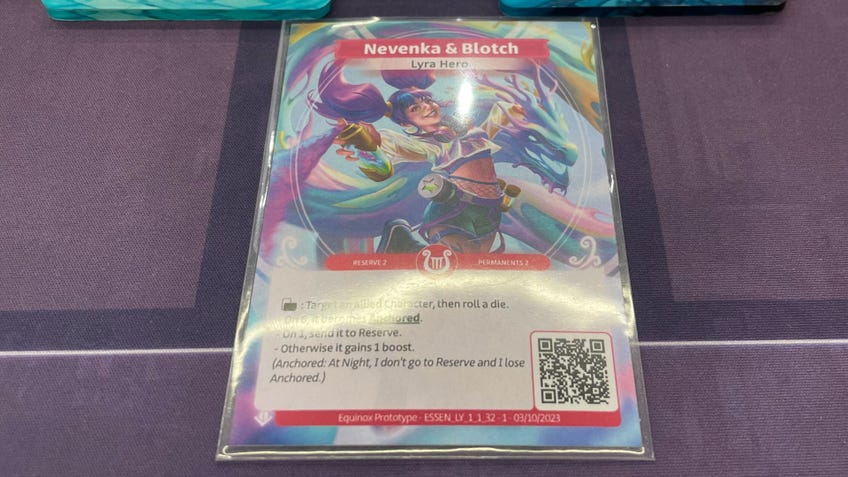
While Altered’s biomes line up fairly squarely with Magic: The Gathering’s natural lands - there are forests, mountains and aquatic islands in the base set - obtaining the resources needed to play cards is more akin to the recent Disney Lorcana. One card can be played facedown on each turn to be used as mana, with three cards played at the start of your game to kickstart your pool.
Played cards are shorter-lived than the typical TCG too, with cards committed to an expedition typically cycling out after a single round. With no direct battles between cards, they simply contribute their points to progressing before leaving. Many cards aren’t discarded, though, instead cycling to two dedicated reserve spots that allow them to be recast the next round, often for a different mana cost - more, or less - and with the potential to gain new abilities by reappearing from the reserve. Cards replayed in this way then gain a ‘fleeting’ status, which sees them fully discarded the next time.
While Altered’s gameplay stands apart from its peers, it’s in the trading card game’s revolutionary approach to collecting that it truly aims to bring something new to the table.
Physical cards will be obtained from $15 starter decks expected to contain at least 30 cards and boosters costing $4 - cheaper than a typical MTG pack - each containing 13 cards: nine commons, three rares and a card that serves either as a token or a "foiler" - more on that in a second. One card is always guaranteed to be a hero.
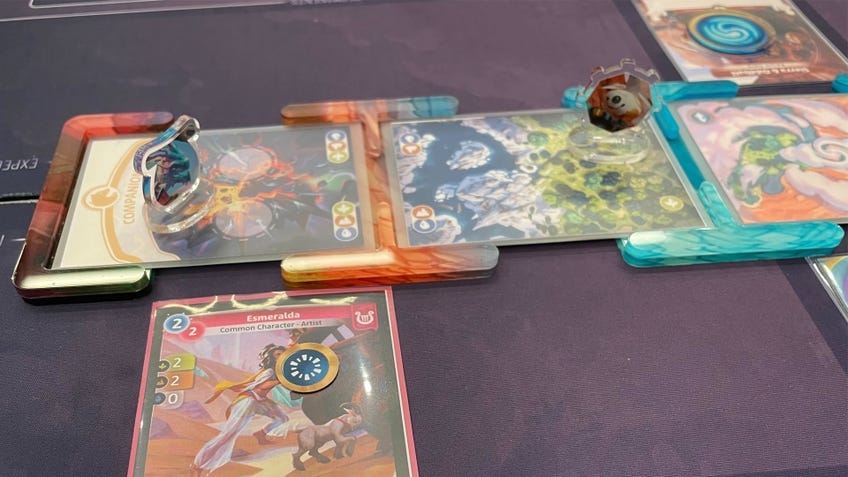
Every card features a QR code that can be scanned to access more information about its place in Altered’s lore and story, as well as registering it to the player’s collection via the game’s PC and mobile app. In a live demonstration, the card scanning tech was able to register multiple overlapped cards in an instant, with Equinox claiming that an entire booster can be scanned in just five seconds.
While the app isn’t required to play the card game, it serves as a key part of the TCG’s offering. Players can use the app to build decks, manage their collection and enter official events. Most importantly, though, it serves as a marketplace for the cards they own.
Unlike other TCG marketplaces, Altered won’t require players to physically exchange cards they trade. Instead, players can buy and sell the rights to specific cards - with the app being the only place they’ll be able to do so.
The point of this is that once a player owns the rights to a card, they can print as many copies of that card as they like - meaning there’s no need to buy dozens of boosters to complete a full set, or chase down a specific card. Buy the rights on the marketplace and you can print unlimited copies, for what Equinox promises will be a small fee tied to the printing and shipping process; cards will cost $1 as a flat rate, with shipping based on the player's location.
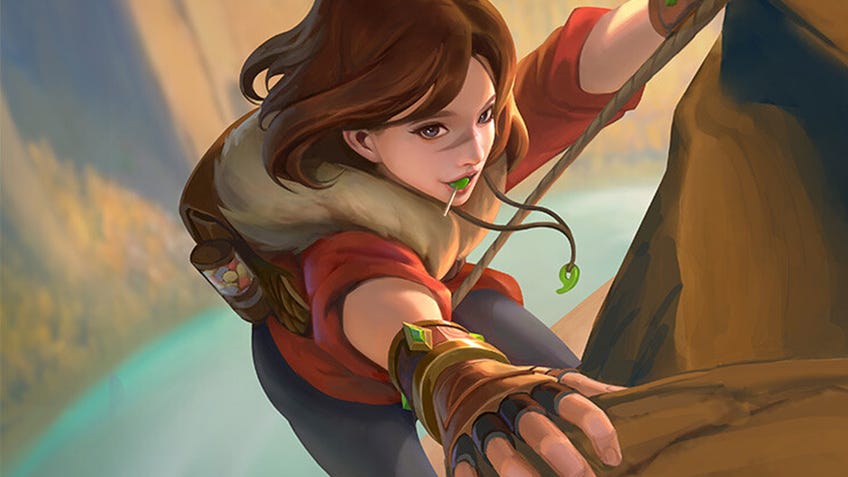
There will be no random foil cards in boosters, either. Instead, those foilers acquired from boosters can be exchanged in the app to foil a card of the player’s choosing, as long as it matches the rarity of the foiler card. While foilers can be sold before being used, foil variants gained using the cards are tied permanently to a player’s account. Equinox added that printing foil cards on demand will be the same as standard cards.
While the vast majority of cards in Altered will be the same for every player, the game will also include unique cards that are singular in the world. Created using an algorithm similar to that used in Keyforge, these rare cards will be variants of existing cards. Every card will exist as a common card, along with two rare variants - one in its original faction, one in another faction - and one unique variant.
Unique cards are predicted to appear in every eight boosters, and may feature different gameplay stats, abilities and artwork compared to their common counterparts, with certain effects being flagged within the algorithm to ensure gameplay balance. (Equinox confirmed that no card would use artwork generated by AI.) Only one unique card will be permitted in each player’s deck, with commons and rare cards having their own deck construction limitations - although Equinox added that it was “experimenting” with allowing up to three uniques in a deck.
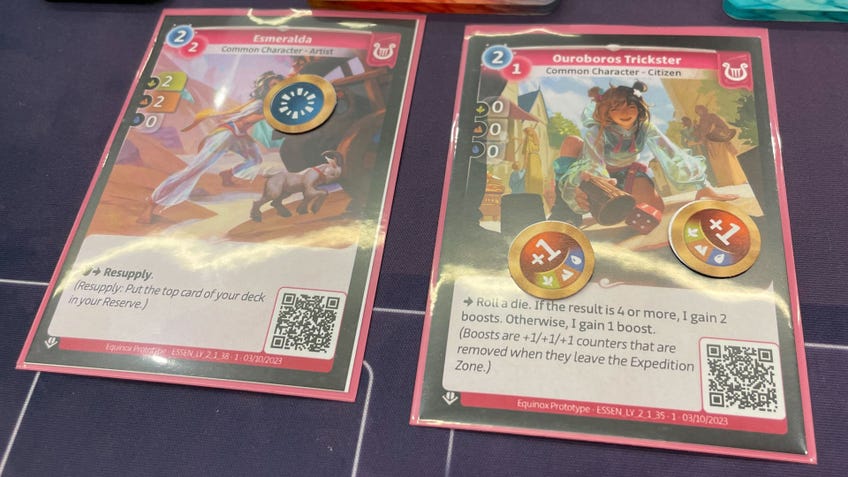
If it works as intended, the ability to buy cards and print on demand looks to directly solve the problem faced by popular TCGs such as Magic: The Gathering, Lorcana and Pokémon, which have suffered availability issues in the wake of huge demand, soaring prices for individual cards and rely on players hunting down the cards they need either in boosters or via potentially pricey singles. Being able to buy the rights to a card and print as many fresh copies as you like in theory would eliminate shutting players out of building their desired deck due to high prices or limited copies.
Equinox confirmed to Dicebreaker that the app element of the game is entirely optional, too, with deck registration of owned cards only necessary for official tournaments - meaning casual players could print as many cards as they like to play casually with friends before selling the rights to their cards to make back their money.
Equinox will launch a Kickstarter campaign on January 30th to crowdfund Altered’s first wave of releases, ahead of fulfilment in Q3 next year and a full release at US convention Gen Con in August 2024. The studio said that it would only run a single campaign for the game before its launch, with a new set planned to release every four months after a first expansion in January 2025.
